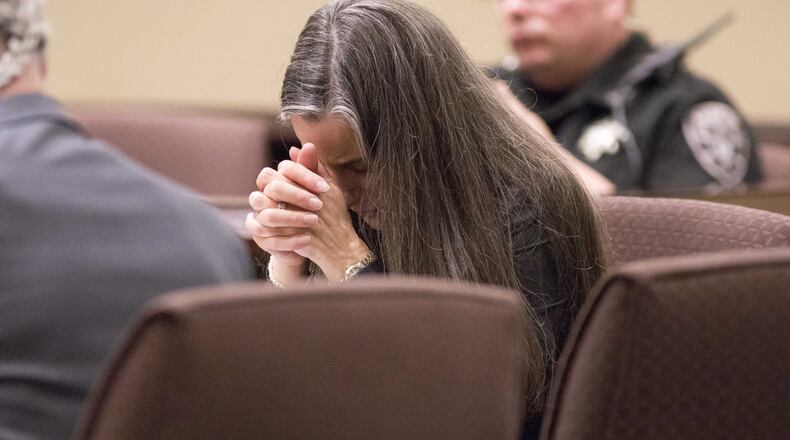Nydia Tisdale wasn’t trying to hide anything or mislead anyone when she arrived at Republican rally at a North Georgia farm with her video camera, her attorneys argued. The citizen journalist was simply doing her part to grow democracy and freedom, according to her defenders.
And a Dawson County jury agreed — mostly. Late Monday afternoon, Tisdale, 54, was acquitted of both a felony obstruction charge and a misdemeanor charge of criminal trespassing. But she was convicted of misdemeanor obstruction, and could still spend up to a year in the county jail. The case ensnared some of Georgia's top political figures, including Gov. Nathan Deal and former Attorney General Sam Olens, who were both at Burt's Pumpkin Farm three years ago when Tisdale was arrested.
COLUMN: Tisdale’s camera pits free speech against property rights
MORE: ‘Stop, you’re hurting me!’ — Trial of citizen journalist gets underway
“If you’re a politician and you’re afraid of what you say in public, there’s no way you should be a politician,” Bruce Harvey, Tisdale’s defense attorney, said outside the courtroom.
Though it was a partial victory for Tisdale, it was still a blow for advocates of journalism and open government, according to Richard Griffiths, Georgia First Amendment Foundation board member and former CNN executive
“It is extremely disturbing that the videoing of a political rally ended in an arrest,” Griffiths said in an emailed statement. “The right to access and to record or report on events to which the public is invited is fundamental in a democracy, and any attempt by public officials to impede that access should greatly concern every Georgia citizen.”
On Aug. 23, 2014, Tisdale attended the GOP rally with plans to video speeches from political candidates, she testified. Before the rally began, Tisdale walked around the grounds, posed for a photo with Olens, and spoke briefly with farm owner Kathy Burt, according to her defense.
Tisdale testified that she believed she had permission to video the rally. But after her camera was on for an hour, Tisdale was removed from the rally by a Dawson County sheriff’s deputy.
In closing arguments Monday morning, prosecutor Conley Greer argued that Tisdale was giving “abundant, ample and repeated notice” to stop filming, but ignored the requests. And, since the event was on private property, the owners or their representatives have the right to make the decisions regarding what happens at Burt’s farm, he said.
“If a person cannot be free on their property, to do with that property and control that property as they see fit, not as a politician sees fit, can they ever be free ever? Ever?” Greer asked the jury.
Tisdale’s defense team argued she did not believe the request to stop recording speeches came from the Burts, and that she did not know then-Capt. Tony Wooten was a member of law enforcement. In footage from Tisdale’s camera, she is heard repeatedly asking Wooten to identify himself as she is being removed from her front-row seat as she held her video camera.
Wooten testified during the six-day trial that he was on-duty during the rally, though the defense questioned his testimony. When he arrested Tisdale, he was wearing khaki pants and a black shirt, which had the Dawson sheriff’s office logo on a sleeve. Tisdale and her attorneys argued she did not know Wooten was a deputy.
RELATED: Top Republicans criticize Tisdale arrest
MORE: Deal, other top Republicans subpoeaned in Tisdale trial
“They haven’t been able to show that any reasonable person would know he was a law enforcement officer and that what he was doing was his lawful duty,” attorney Catherine Bernard told the jury. “His actions are not something to be proud of that day.”
Tisdale testified that Wooten squeezed her skin and forced her to bend over a counter with her hands behind her back.
“With him pushing his groin against my buttocks I felt like I was being raped with my clothes on,” Tisdale said on the witness stand.
But prosecutors argued that Tisdale fought with Wooten, striking him in the face and shin, and that she should have known he was a deputy.
“No matter what circumstance occurred, she was not going to stop filming,” Greer said.
The jury deliberated for about three and a half hours before reaching its verdict. Greer declined to speak about the verdict outside of the courtroom. Harvey said all citizens can learn from the jury’s decision.
He said he believed that though jurors believed Tisdale resisted her arrest, there was not enough evidence to persuade them that she was violent toward the deputy who removed her from her seat at the rally nor that was on the property illegally.
“I truly hope that everybody learns a lesson in that we go down the road and we become better citizens, and more open citizens and a more open government,” he said.
Sentencing for Tisdale is scheduled for Dec. 18 at 9:30 a.m. Judge Martha Christian could decide to sentence Tisdale as a first offender, meaning that she would not have a criminal record.
About the Author
Keep Reading
The Latest
Featured





